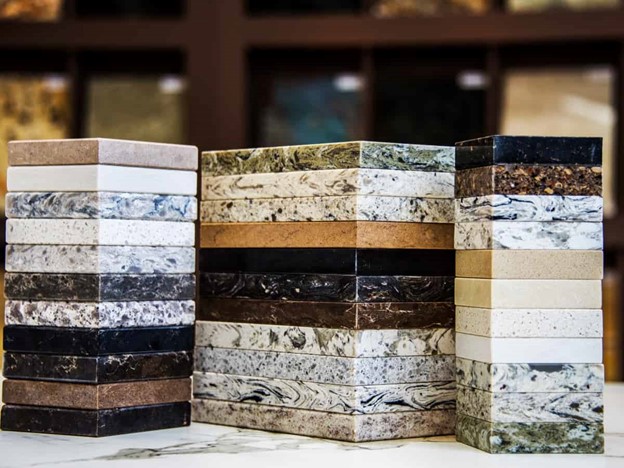How to Seal Granite Countertops? (Step-by-step)

Granite is one of the most popular countertop materials as it is a highly durable and versatile option. Granite countertops are not only a stunning addition to any kitchen or bathroom, it also offer functionality, making them a well-rounded material.
However, to ensure that they can stand the test of time they need to be sealed so that outside factors such as moisture and dirt can’t blemish the stone. Whether you are a first-timer or a DIY enthusiast, keep reading to find out how to seal granite countertops. In this guide, we will delve into the why, when, and how of sealing countertops so that your gorgeous investment can withstand daily wear and tear for years to come.
Why Sealing Granite is Important?
Granite is a natural stone and equal to all other natural stones, it is a porous material. In other words, it has tiny holes all over it which can house dirt, moisture, and food particles, and they can turn into stains and grow bacteria.
To combat this, sealing the countertops is a must. The sealant acts as a barrier between the stone and the world, protecting it from outside elements that can cause discoloration and damage. Understanding how to seal granite countertops is an important aspect of maintaining their beauty and functionality.
Moreover, this also makes any possible spills easier to clean and maintain the pristine condition of the countertops. The longer the countertops remain unsealed, the longer it will be susceptible to blemishes. The barrier that this sealant creates will ensure that spills and particles will remain on the surface of the stone instead of seeping deeper into the pores of the granite countertops.
How Often Should You Seal Granite?
The sealant that is applied on the countertop will protect the countertops, however, as time goes by the sealant layer on top will wear down and need to be replenished. The resealing will guarantee that the sealant layer is thick and strong enough to act as a barrier.
The period in which you will need to reseal the countertops will depend on the specific circumstances. For example, the frequency of usage will influence when you will need to reseal. If you use your countertops multiple times a day, the frequency will be higher than someone who uses their countertops very rarely or doesn’t cook often.
Another thing to keep in mind is the quality of the stone. Higher-quality stone options will be denser and less porous compared to lower, or even medium quality options. This isn’t to say that stones with more density don’t need to be resealed, but they tend to be more durable, needing less frequent resealing.
A good way to estimate the right time for resealing is to examine the countertops. As the countertops near the time of resealing, the shine on the surface will start to dull. You might also start to notice that stains and splatters don’t come off as easily as they did when they were newly installed. If you notice these signs, it is time to reseal your countertops.
Choosing the Right Sealer
Selecting the right sealer is an important part of the process and can help in prolonging the lifetime of the countertops. The two main types of sealers are penetrating sealers and topical sealers.
Penetrating sealers: Penetrating sealers, as the name suggests, penetrate the stone and get absorbed. They provide protection from within and they are incredibly effective. They are a great option because penetrating sealers have the advantage of not altering the appearance of the stone while offering long-lasting protection.
Topical sealers: As opposed to penetrating sealers, topical sealers sit on the surface of the stone, forming a protective barrier. They can provide a high-gloss finish, however they might need more frequent reapplication compared to penetrating sealers.
While trying to make the right choice between the two different sealers, the first thing to consider is the optimal protection. You should look for sealers that offer protection against both water-based and oil-based stains. Moreover choosing one that is also resistant to UV rays will ensure that the countertops will be given even more protection.
Step-by-step Guide to Sealing Granite Countertops
Sealing your countertops might seem daunting. Follow these easy steps for simple instructions to find out how to seal granite countertops.
Step 1: Preparation
The first step of sealing the countertops starts with preparing the surface for the application. If there is any dirt and debris on the countertops during the time of the sealing, they will be trapped underneath the barrier and you won’t be able to remove it.
Clear all of the items off the countertops and use a mixture of mild dish soap and water to wipe off all of the dirt and grease. Use a soft cloth to clean and then rinse the countertops. It is essential to dry the countertops after this process to remove any moisture. You can also tape off backsplashes, sinks, or any adjacent surfaces you want to protect.
Step 2: Testing the porosity
On the clean granite countertops, test the porosity to correctly assess how much sealer you will need to apply on the countertops for optimal protection. You can do the test by pouring a few water droplets on the stone to see if they get absorbed. If it soaks in quickly, it is highly porous and will need more sealer.
Step 3: Application
Before application, read the instructions on the bottle thoroughly. Apply the sealer on the countertops using a soft, microfiber cloth and work in small sections. Pour some of the sealer on an area and apply it in circular motions using the cloth. Try to make the application as even as you can throughout the stone.
Step 4: Curing
Allow the sealer to sit for the recommended time on the bottle, this will ensure that it penetrates the stone and provides the necessary protection. If you have a very porous granite, a second coat might also be necessary. Then, use a clean microfiber cloth to buff the surface for a smooth finish. Don’t use the countertops for 48 hours so the sealer can set. Once set, your countertops will be ready for use.
If you are interested in installing granite countertops in your commercial or residential property, look no further than Keystone Granite and Marble. As a leader in the industry, Keystone has the experience and know-how to help you through the renovation process in a smooth way.
Their wide range of granite selection will guarantee that your new countertops will not only fit in with your home seamlessly, but they will also elevate the aesthetic beauty of the space. Moreover, the amazing customer care team at Keystone will inform you about all of the necessary steps of granite countertop ownership, such as how to maintain and how to seal granite countertops.




